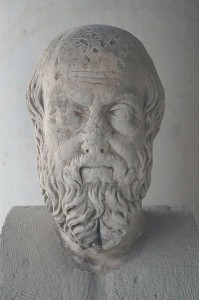Herodotus (2)
Herodotus of Halicarnassus (c.480-c.429 BCE): Greek researcher, often called the world's first historian. In The Histories, he describes the expansion of the Achaemenid Empire under its kings Cyrus the Great, Cambyses, and Darius I the Great, culminating in Xerxes' expedition to Greece (480 BCE), which met with disaster in the naval engagement at Salamis and the battles at Plataea and Mycale. Herodotus' book also contains ethnographic descriptions of the peoples that the Persians have conquered, fairy tales, gossip, and legends.
Herodotus' Life

Not much is known about Herodotus' life. The only reliable source we have is the book he wrote, known as The Histories, and this remarkable text gives us some clues that enable us to sketch the outlines of its writer's life. As its prologue shows, Herodotus was born in a town called Halicarnassus: modern Bodrum in southwestern Turkey. Not far from Herodotus' native city is the island Samos, which figures so prominently in The Histories, that it has been argued that Herodotus spent several years on it. The same argument applies to Athens: Herodotus may have spent some time in the leading Greek city of his age.
It is unknown when or why he left his home town. Two or three centuries after Herodotus' death, scholars from Alexandria assumed that the historian was banished because he had been involved in an abortive coup attempt. Unfortunately, there are many ancient historians who were forced to spend part of their lives abroad after a political failure (e.g., Thucydides, Theopompus of Chios, Timaeus, and Polybius of Megalopolis). Probably, it is safer to ignore this piece of scholarly speculation.
The famous Macedonian philosopher Aristotle of Stagira (384-322 BCE) must have heard or read The Histories. In his book on Rhetorics, he quotes its first line:
Herodotus of Thurii hereby publishes the results of his inquiries...note
An easy way to explain this variant reading of Herodotus' opening line is that Aristotle was simply mistaken. However, the philosopher's infallibility has been axiomatic for centuries, and many scholars - ancient and modern - have tended to believe that Herodotus was one of the settlers in the South-Italian city Thurii, which was founded in 444 BCE. A medieval dictionary, the Suda, mentions Herodotus' tomb on the market of Thurii (Suda H536); this was a high honor, only attributed to the (often legendary) founders of new cities. Of course it is possible that Herodotus was the founder of Thurii, but probably we are better advised to take the Suda's statement with a grain of salt, especially since Athens and Pella (in Macedonia) also claimed his tomb. It is imaginable that the Thurians have invented theirs after reading Aristotle.

The year of Herodotus' death is unknown, but we have two clues. Herodotus mentions the execution of two Spartans in Athens,note about which we also know from another source, Thucydides.note It happened in the winter of 430/429 BCE. Therefore, Herodotus was still alive and writing in 429. Since it is also known that in the summer of 429 many Athenians were killed by the plague, it may be conjectured that Herodotus was one of the victims of this disease. However this may be, he must have died before 413, because he tellsnote that a certain village in the neighborhood of Athens, Decelea, was never plundered by the Spartans, something that did in fact happen in 413, as Thucydides tells us.note
Assuming that Herodotus died between 429 and 413, it is reasonable to infer that he was born between 500 and 470. Perhaps we can be a little bit more precise: nowhere in The Histories does he claim to have witnessed the great Persian War (480-479 BC) that he is describing. Therefore, his date of birth can be estimated in the eighties of the fifth century BC.
The author of The Histories seems to have been a real globetrotter. If we are to believe him, he was no stranger in Babylon, where he interviewed the priests; he claims to have gone north to the Crimea and south along the Nile; he visited Sicily and knows the details of North-African topography. However, some doubts are possible: e.g., his description of Babylon is contradicted by archaeological evidence. On the other hand, in his description of the Crimea, he mentions a king known to have lived around 460, which makes it likely that he really visited that part of the world.
That he was able to write, is a fact easily ignored. However, it tells us that his parents could afford a teacher and were well to do. Herodotus must have been a rich man, possibly a member of the old aristocracy. We may speculate that he fought as a heavy armored infantryman (a hoplite), like all Greek men of his class and age. This would explain why his descriptions of battles are always from a soldier's point of view and sometimes confused. He was a soldier, not a general.
This is all we know about the Father of History: frustratingly little. Yet, there are only a few ancient writers that we know as well as Herodotus. Other authors wrote longer texts, were greater historians, or reached greater intellectual heights, but none of them is able to convey the same feeling of intimate friendship that we experience when we read Herodotus. We meet him when he is in a dark mood, share his surprise, know his religious opinions, hear him chattering, joking and babbling. There is no ancient author whose character we know so well as the man about whose life we know so little. The solution to this paradox lies in The Histories